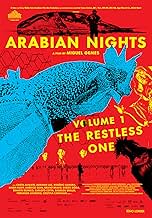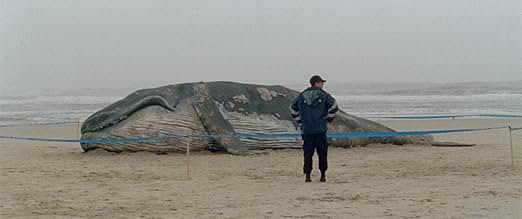1001 Nacht: Volume 1: Der Ruhelose
Originaltitel: As Mil e Uma Noites - Volume 1: O Inquieto
IMDb-BEWERTUNG
6,9/10
2547
IHRE BEWERTUNG
In diesem Epos werden einige Kapitel aus Tausendundeiner Nacht in das Portugal von heute übertragen.In diesem Epos werden einige Kapitel aus Tausendundeiner Nacht in das Portugal von heute übertragen.In diesem Epos werden einige Kapitel aus Tausendundeiner Nacht in das Portugal von heute übertragen.
- Regie
- Drehbuch
- Hauptbesetzung
- Auszeichnungen
- 16 Gewinne & 23 Nominierungen insgesamt
Empfohlene Bewertungen
"As Mil e Uma Noites" is the latest film by the Portuguese Miguel Gomes, a director who already caught my special attention with his "Tabu", which also received very positive appreciation, in Portugal and internationally. His new work, a trilogy amassing 381 minutes divided in 3 Volumes, debuted at Cannes, at the Director's Fortnight, having been considered for Palm d'Or but it's sheer duration would be problematic for the festival's agenda. Meanwhile, it has already won some prizes, such as at the Sidney FF, among other nominations. Miguel Gomes called upon the Thai cinematographer Sayombhu Mukdeeprom, notorious for having regularly worked with "Joe" in pictures like Uncle Boomnee Who Can Recall His Past Lives, winner of the Palm d'Or in 2010, which becomes glaring in some framing layouts, color tones and especially in a scene where a woman fades with a film technique identical to the one used in "Boonmee".
I will write about the first Volume, "The Restless", which is now screening in some (too few) Portuguese cinema theaters.
The movie starts in a documentary style, with the narrated account of the workers at the shipyards of Viana do Castelo about their imminent mass dismissal, speaking interchangeably and in parallel with another narrated report, from the same Portuguese region, but without any causal relationship, of a bee-keeper and handyman who fights against a plague of foreign wasps. This apparent lack of correlation between these two events provokes a creative crisis of the film Director, who is keen on peculiarly showing himself running away from his own film crew, because he fears he may be lacking the ability to carry on his quest of portraying on the big screen the various episodes during the Portuguese financial crisis. The film thus becomes self-aware, channeling a Charlie Kaufman screenplay (Adaptation.). In order to satisfy his film crew, Miguel Gomes then proceeds, in a bizarre context, to explain his intention of telling a series of stories, loosely on the lines of the Arabian Scheherazade homonymous frame tale.
The next segment is probably the most silly, where what might seem to be a serious meeting with the Portuguese government and the "troika" representatives (who Miguel Gomes clearly critiques, presenting both parties with a clear "lack of social justice notion"), quickly becomes an anedoctic and highly surrealistic and delirious episode that satirizes the twists and turns of their decisions, relaying to the lack of "vigour" (sexual innuendo) of the stakeholders, as well as their communication issues inherent to the internationality of the meeting. It is, accordingly, the most Buñuel of the segments of the movie, which the author titled "The Men with Hard-Ons".
The following segment, "The Story of the Cockerel and the Fire", is my personal favourite of the volume, which tells a true story in the town of Resende about a rooster that is trialled for disturbing the neighbours with its loudness. Meanwhile, municipal elections are ongoing -- which are subject of quaint provincial conversations, as well as town festivities, and frequent arsons in the mountain range. This set of phenomena might seem unfocused, recalling the initial troubles of the Director's ability to correlate between such events, which solely seem to share a common site, but behold as we re-enter the surrealist context and Miguel Gomes introduces in the narrative an ephemeral Asian character who spits a charade about the "flames" of the village, and, more extravagantly, grants the "singing" rooster the ability to speak in his defence to the judge before being condemned to go to the cooking pot and explaining the missing correlation (and even causality) between the arsons, an innocent story of teenage crush which were in the origin of the crimes, and his own loud nocturnal manifestations, that were no more than an attempt to warn the town of the fires that were to happen. This is the most folkloric segment, where Gomes channels some idiosyncrasies of Kusturica, particularly on a typically Portuguese character who accompanies the judge while joyfully playing his accordion.
In the last segment of this Volume, takes place in Aveiro (the city where I'm finishing University), and captures some pretty imagery of the region's "Barra" lighthouse -- the second tallest of the Iberic Peninsula. Here, we follow the difficulties of the fugleman of "The Bath of the Magnificents", who suffers from heart disease, and hears the testimonies of three "Magnificents" of the region, who tell their stories of crossing severe financial difficulties. The "Bath" at the beach of "Barra" takes place in the first of January and seems to be a way of starting a new year with the superstition of better times ahead In-between, the punctual doses of satirical surrealism are not missing, with a quirky "medical appointment" and an "exploding" dead whale, which got stuck in the sand of the aforementioned beach -- significances to be deciphered by the viewers.
I will be anxiously waiting for the second Volume, "The Desolated", for another two hours of a cinematic experience with an identity so inextricably Portuguese that I will certainly not lose.
I will write about the first Volume, "The Restless", which is now screening in some (too few) Portuguese cinema theaters.
The movie starts in a documentary style, with the narrated account of the workers at the shipyards of Viana do Castelo about their imminent mass dismissal, speaking interchangeably and in parallel with another narrated report, from the same Portuguese region, but without any causal relationship, of a bee-keeper and handyman who fights against a plague of foreign wasps. This apparent lack of correlation between these two events provokes a creative crisis of the film Director, who is keen on peculiarly showing himself running away from his own film crew, because he fears he may be lacking the ability to carry on his quest of portraying on the big screen the various episodes during the Portuguese financial crisis. The film thus becomes self-aware, channeling a Charlie Kaufman screenplay (Adaptation.). In order to satisfy his film crew, Miguel Gomes then proceeds, in a bizarre context, to explain his intention of telling a series of stories, loosely on the lines of the Arabian Scheherazade homonymous frame tale.
The next segment is probably the most silly, where what might seem to be a serious meeting with the Portuguese government and the "troika" representatives (who Miguel Gomes clearly critiques, presenting both parties with a clear "lack of social justice notion"), quickly becomes an anedoctic and highly surrealistic and delirious episode that satirizes the twists and turns of their decisions, relaying to the lack of "vigour" (sexual innuendo) of the stakeholders, as well as their communication issues inherent to the internationality of the meeting. It is, accordingly, the most Buñuel of the segments of the movie, which the author titled "The Men with Hard-Ons".
The following segment, "The Story of the Cockerel and the Fire", is my personal favourite of the volume, which tells a true story in the town of Resende about a rooster that is trialled for disturbing the neighbours with its loudness. Meanwhile, municipal elections are ongoing -- which are subject of quaint provincial conversations, as well as town festivities, and frequent arsons in the mountain range. This set of phenomena might seem unfocused, recalling the initial troubles of the Director's ability to correlate between such events, which solely seem to share a common site, but behold as we re-enter the surrealist context and Miguel Gomes introduces in the narrative an ephemeral Asian character who spits a charade about the "flames" of the village, and, more extravagantly, grants the "singing" rooster the ability to speak in his defence to the judge before being condemned to go to the cooking pot and explaining the missing correlation (and even causality) between the arsons, an innocent story of teenage crush which were in the origin of the crimes, and his own loud nocturnal manifestations, that were no more than an attempt to warn the town of the fires that were to happen. This is the most folkloric segment, where Gomes channels some idiosyncrasies of Kusturica, particularly on a typically Portuguese character who accompanies the judge while joyfully playing his accordion.
In the last segment of this Volume, takes place in Aveiro (the city where I'm finishing University), and captures some pretty imagery of the region's "Barra" lighthouse -- the second tallest of the Iberic Peninsula. Here, we follow the difficulties of the fugleman of "The Bath of the Magnificents", who suffers from heart disease, and hears the testimonies of three "Magnificents" of the region, who tell their stories of crossing severe financial difficulties. The "Bath" at the beach of "Barra" takes place in the first of January and seems to be a way of starting a new year with the superstition of better times ahead In-between, the punctual doses of satirical surrealism are not missing, with a quirky "medical appointment" and an "exploding" dead whale, which got stuck in the sand of the aforementioned beach -- significances to be deciphered by the viewers.
I will be anxiously waiting for the second Volume, "The Desolated", for another two hours of a cinematic experience with an identity so inextricably Portuguese that I will certainly not lose.
A binge-watching of Portuguese auteur-in-the-making Miguel Gomes' Herculean ARABIAN NIGHTS trilogy, his fourth feature, the much-anticipated follow-up after TABU (2012), his critically acclaimed present/past diptych stunner.
Consciously informing audience beforehand with its caption - "The film is not an adaptation of the book ARABIAN NIGHTS despite drawing on its structure", the three volumes of ARABIAN NIGHTS constitute an expansive ethnic dissection of Portugal's burning mire, all the stories told by Scheherazade (Alfaiate) stem from events confined within a single calendar year from August 2013 to July 2014 in Portugal, when its people are stricken with economic austerity and become impoverished, implement by the government which Gomez denounces devoid of social justice.
Volume 1, The Restless One, presents at the get-go a documentary preamble fixates on two paralleled topics, one is the closure of a large shipyard and its ramifications of workers' layoff, another is about the exigent countermeasure to the plague of wasps which blights the local apiculture.
After a brief introduction of Scheherazade and her nightly undertaking, she starts to narrate the stories, which allegedly should be scintillating enough to keep her alive from the killing-prone king.
The Men with Hard-ons is an outré caricature, government kingpins, including the Prime Minister of Portugal (Samora), are negotiating the future of the country with several other foreign capitalists, when a magician offers a cure of their collective impotence, they all accept it but soon find the flip side of a perpetual hard-on. This allegory runs out of gas quickly being too self- conscious all the time, it seems that ridicule is not Gomez's strongest suit.
The Story of the Cockerel and the fire, is executed with a more naturalistic spin, but the magic element continues, a love triangle (impersonated by three teenagers) is behind a sagacious cockerel's early-morning crowing, which causes some legal action for the owner and concurs with the election in an arson-rampant rural town. Weaving a fly-on-the-wall approach of fabricating a tall tale into expressing social critique with a critical eye, Gomes seems to find his footing.
The third story, the Swim of the Magnificents, carries on further with this methodology, plies audience with some very stimulating visual grandeur and idiosyncrasy, a fetid clinic (looks like being built in a cavity of a dead whale), follows by a stranded whale and its sudden explosion, leaves a struggling mermaid on the beach, a culmination achieved by a throng of people celebrating New Year's Day in the fashion of winter swimming in the sea, that is the spirit, alleviating the sore generated from the previous three accounts of personal crisis caused by unemployment. Blending real and surreal, Volume One ends with a moderately impressive note.
Consciously informing audience beforehand with its caption - "The film is not an adaptation of the book ARABIAN NIGHTS despite drawing on its structure", the three volumes of ARABIAN NIGHTS constitute an expansive ethnic dissection of Portugal's burning mire, all the stories told by Scheherazade (Alfaiate) stem from events confined within a single calendar year from August 2013 to July 2014 in Portugal, when its people are stricken with economic austerity and become impoverished, implement by the government which Gomez denounces devoid of social justice.
Volume 1, The Restless One, presents at the get-go a documentary preamble fixates on two paralleled topics, one is the closure of a large shipyard and its ramifications of workers' layoff, another is about the exigent countermeasure to the plague of wasps which blights the local apiculture.
After a brief introduction of Scheherazade and her nightly undertaking, she starts to narrate the stories, which allegedly should be scintillating enough to keep her alive from the killing-prone king.
The Men with Hard-ons is an outré caricature, government kingpins, including the Prime Minister of Portugal (Samora), are negotiating the future of the country with several other foreign capitalists, when a magician offers a cure of their collective impotence, they all accept it but soon find the flip side of a perpetual hard-on. This allegory runs out of gas quickly being too self- conscious all the time, it seems that ridicule is not Gomez's strongest suit.
The Story of the Cockerel and the fire, is executed with a more naturalistic spin, but the magic element continues, a love triangle (impersonated by three teenagers) is behind a sagacious cockerel's early-morning crowing, which causes some legal action for the owner and concurs with the election in an arson-rampant rural town. Weaving a fly-on-the-wall approach of fabricating a tall tale into expressing social critique with a critical eye, Gomes seems to find his footing.
The third story, the Swim of the Magnificents, carries on further with this methodology, plies audience with some very stimulating visual grandeur and idiosyncrasy, a fetid clinic (looks like being built in a cavity of a dead whale), follows by a stranded whale and its sudden explosion, leaves a struggling mermaid on the beach, a culmination achieved by a throng of people celebrating New Year's Day in the fashion of winter swimming in the sea, that is the spirit, alleviating the sore generated from the previous three accounts of personal crisis caused by unemployment. Blending real and surreal, Volume One ends with a moderately impressive note.
The pressures of the social obligations from the recent Portuguese economic crisis in how to approach this loose adaptation of "One Thousand And One Nights" cut deep into director Miguel Gomes. He satisfied his anxiety by including his own personal struggle with a humorous twist in the first thirty minutes of his sprawling 6-hour Arabian Nights. Spliced between dual documentaries about a shipyard closure and wasp exterminators, Gomes – appearing on screen – literally evades his camera crew while they take chase. His nerves reflect the angst of the Portuguese people, but his eventual resolve in ultimately completing the film is a promising hint of hope, at least in a way to defy the government.
The opening of each volume of Arabian Nights – entitled "The Restless One", "The Desolate One" and "The Enchanted One" respectively – begin with a direct message from Gomes to establish what to expect, as well as to provide a pseudo-mission statement. It declares how this is not a direct adaptation despite drawing on the structure and the vignettes are based on events that happened between 2013 and 2014 where Portugal was 'held hostage' by its negligent government. The film always appears to have one step out of its fiction, but it's justified by its documentary prologue. The framing for the format, something that should be somewhat familiar to most, shows a Queen called Scheherazade who has to tell her King compelling stories and cut them off at night to ensure he wants to hear the rest of the story the next day to evade him killing her, and thus future Queens.
In adapting the spirit of the classic set of tales, it gives Gomes the freedom to explore different types of styles going from fantasy, to documentary, to fiction, to docu-fiction, and sometimes blending them together. As each story isn't firmly attached to a single protagonist, the film frequently has irreverent tangents with subplots briefly taking the foreground. While people may be on screen without an arc, it's a clear goal of the film to show how each individual has a rich full life with their own dramas that affect others too. It turns these modern day struggles into myths – and also shows how those myths are worthy enough to engage a hypothetical King. In employing non-actors, it continues to blur that line between fiction and nonfiction and makes Arabian Nights a film for the people while the subdued emotion of them soaks through.
Despite initially intended to be a single 6-hour feature, each of the three volumes are quite different in style and quality. The first volume is dense and absurd, both the most inaccessible and accessible part depending on how you feel about Gomes' approach. It's rewarding for those willing to traverse it. After introducing the values of the film with the opening documentary and the concept for its format in showing Scheherazade and her people coming up with the stories, the first vignette is the most bizarre and perhaps immature given the weight of the film. It travels with a group of impotent capitalists who are cursed with permanent erections and how that affects their attitudes to how they influence Portugal's financial. It's hilarious and thoughtful, showing just how on-the-nose but equally on-point Arabian Nights is willing to get. Volume 1's energy and unabashed direction earned a grin on my face whenever it wasn't documenting distress.
The following vignettes include one about a talking cockerel who's a controversial point in a town as he crows loudly in the early morning, though his intentions are to warn about wildfires, and another where a man disgruntled by the economy and arranges other unemployed people to join in a New Year's Day swim in the ocean as an act of defiance against the government. Each person tells their story – or their story is told by Scheherazade – and their hardships of their money going to waste are easy to empathise with, especially if you've experienced dejection such as they're facing. Like his masterful previous film Tabu – a diptych of sorts while Arabian Nights is a triptych within a triptych – this film also has an old-fashioned style. It has the rawness and vibrancy of the films of the 70s, though that aesthetic may not be as deliberate as Tabu's 1930s style.
See the other volumes for the rest of my review for Arabian Nights.
8/10
Read more @ The Awards Circuit (http://www.awardscircuit.com/)
The opening of each volume of Arabian Nights – entitled "The Restless One", "The Desolate One" and "The Enchanted One" respectively – begin with a direct message from Gomes to establish what to expect, as well as to provide a pseudo-mission statement. It declares how this is not a direct adaptation despite drawing on the structure and the vignettes are based on events that happened between 2013 and 2014 where Portugal was 'held hostage' by its negligent government. The film always appears to have one step out of its fiction, but it's justified by its documentary prologue. The framing for the format, something that should be somewhat familiar to most, shows a Queen called Scheherazade who has to tell her King compelling stories and cut them off at night to ensure he wants to hear the rest of the story the next day to evade him killing her, and thus future Queens.
In adapting the spirit of the classic set of tales, it gives Gomes the freedom to explore different types of styles going from fantasy, to documentary, to fiction, to docu-fiction, and sometimes blending them together. As each story isn't firmly attached to a single protagonist, the film frequently has irreverent tangents with subplots briefly taking the foreground. While people may be on screen without an arc, it's a clear goal of the film to show how each individual has a rich full life with their own dramas that affect others too. It turns these modern day struggles into myths – and also shows how those myths are worthy enough to engage a hypothetical King. In employing non-actors, it continues to blur that line between fiction and nonfiction and makes Arabian Nights a film for the people while the subdued emotion of them soaks through.
Despite initially intended to be a single 6-hour feature, each of the three volumes are quite different in style and quality. The first volume is dense and absurd, both the most inaccessible and accessible part depending on how you feel about Gomes' approach. It's rewarding for those willing to traverse it. After introducing the values of the film with the opening documentary and the concept for its format in showing Scheherazade and her people coming up with the stories, the first vignette is the most bizarre and perhaps immature given the weight of the film. It travels with a group of impotent capitalists who are cursed with permanent erections and how that affects their attitudes to how they influence Portugal's financial. It's hilarious and thoughtful, showing just how on-the-nose but equally on-point Arabian Nights is willing to get. Volume 1's energy and unabashed direction earned a grin on my face whenever it wasn't documenting distress.
The following vignettes include one about a talking cockerel who's a controversial point in a town as he crows loudly in the early morning, though his intentions are to warn about wildfires, and another where a man disgruntled by the economy and arranges other unemployed people to join in a New Year's Day swim in the ocean as an act of defiance against the government. Each person tells their story – or their story is told by Scheherazade – and their hardships of their money going to waste are easy to empathise with, especially if you've experienced dejection such as they're facing. Like his masterful previous film Tabu – a diptych of sorts while Arabian Nights is a triptych within a triptych – this film also has an old-fashioned style. It has the rawness and vibrancy of the films of the 70s, though that aesthetic may not be as deliberate as Tabu's 1930s style.
See the other volumes for the rest of my review for Arabian Nights.
8/10
Read more @ The Awards Circuit (http://www.awardscircuit.com/)
Wusstest du schon
- VerbindungenFollowed by 1001 Nacht: Volume 2: Der Verzweifelte (2015)
- SoundtracksDiferencas de Guardame las Vacas
Written and performed by José Miguel Moreno
Top-Auswahl
Melde dich zum Bewerten an und greife auf die Watchlist für personalisierte Empfehlungen zu.
- How long is Arabian Nights: Volume 1 - The Restless One?Powered by Alexa
Details
- Erscheinungsdatum
- Herkunftsländer
- Offizielle Standorte
- Sprachen
- Auch bekannt als
- Arabian Nights: Volume 1 - The Restless One
- Drehorte
- Viana do Castelo, Minho, Portugal(first part: shipyard)
- Produktionsfirmen
- Weitere beteiligte Unternehmen bei IMDbPro anzeigen
Box Office
- Bruttoertrag in den USA und Kanada
- 12.260 $
- Weltweiter Bruttoertrag
- 28.245 $
- Laufzeit2 Stunden 5 Minuten
- Farbe
- Seitenverhältnis
- 2.35 : 1
Zu dieser Seite beitragen
Bearbeitung vorschlagen oder fehlenden Inhalt hinzufügen

Oberste Lücke
By what name was 1001 Nacht: Volume 1: Der Ruhelose (2015) officially released in India in English?
Antwort





























